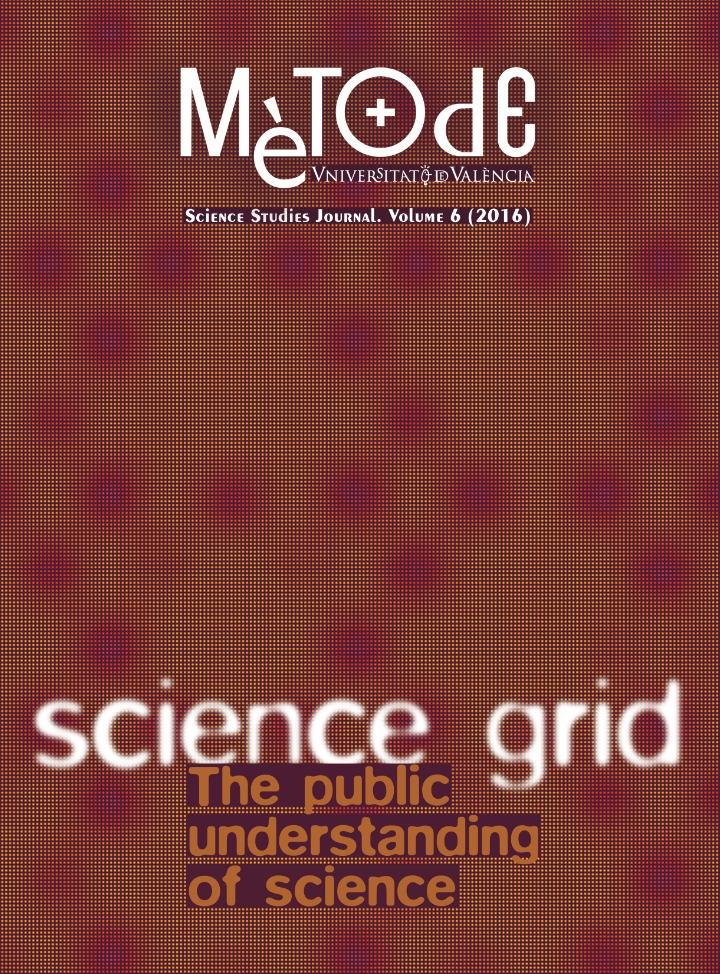Disaster, uncertainty, opportunity or risk? Key messages from the television coverage of the IPCC’s 2013/2014 reports
DOI:
https://doi.org/10.7203/metode.6.4179Keywords:
climate change, media coverage, IPCC reports, Europe Abstract
Abstract
This article examines the television coverage of the three 2013 and 2014 reports by the Working Groups of the IPCC in five European countries: Germany, Norway, Poland, Spain and the United Kingdom. The presence, salience and dominance of four frames (disaster, uncertainty, explicit risk and opportunity) were examined in each of the bulletins monitored. The «disaster» frame was the strongest of all the frames, measured by all three metrics. «Opportunity» was the next most present, followed by «uncertainty». Although the IPCC put considerable emphasis on a risk management approach to tackling climate change in its communication of the WG2 report, the «explicit risk» frame was hardly present. The UK stood out for including some coverage of sceptical viewpoints.
 Downloads
Downloads
 References
References
Adler, C. E., & Hadorn, G. H. (2014). The IPCC and treatment of uncertainties: topics and sources of dissensus. WIREs Climate Change, 5, 663–676. doi: 10.1002/wcc.297
Anderson, A. (2014). Media, environment and the network society. Houndmills: Palgrave Macmillan. Antilla, L. (2005). Climate of scepticism: US newspaper coverage of the science of climate change. Global Environmental Change, 15, 338–352. doi: 10.1016/j.gloenvcha.2005.08.003
Brossard, D., Shanahan J., & McComas, K. (2004). Are issue-cycles culturally constructed? A comparison of French and American coverage of global climate change. Mass Communication and Society, 7, 359–377. doi: 10.1207/s15327825mcs0703_6
Corbett, J., & Durfee, J. (2004). Testing public (un)certainty of science: Media representations of global warming. Science Communication, 26, 129–151. doi: 10.1177/1075547004270234
Cottle, S. (1993). Mediating the environment: Modalities of TV news. In A. Hansen (Ed.), The mass media and environmental issues. Leicester: Leicester University Press.
Dirikx, A., & Gelders, D. (2009). Global warming through the same lens: An explorative framing study in Dutch and French newspapers. In T. Boyce, & J. Lewis (Eds.). Climate change and the media. New York: Peter Lang.
Doulton, H., & Brown, K. (2009). Ten years to prevent catastrophe? Discourses of climate change and international development in the UK press. Global Environmental Change, 19, 191–202. doi: 10.1016/j.gloenvcha.2008.10.004
Doyle, A. (2013, September 18). Amid “uncertainty”, scientists blame mankind for global warming. Reuters.
Engels, A., Hüther, O., Schäfer, M., & Held, H. (2013). Public climate-change scepticism, energy preferences and political participation. Global Enviromental Change, 23(5), 1018–1027. doi: 10.1016/j.gloenvcha.2013.05.008
Entman, R. M. (1993). Framing: Toward clarification of a fractured paradigm. Journal of Communication, 43(4), 51–58. doi: 10.1111/j.1460-2466.1993.tb01304.x
IPCC. (2014). Intergovernmental panel on climate change: Fifth assessment report (AR5). Geneva: IPCC.
Kundzewicz, Z. W., & Matczak, P. (2012). Climate change regional review: Poland. WIREs Climate Change, 3: 297–311. doi: 10.1002/wcc.175
León, B., & Erviti, M. C. (2015). Science in pictures: Visual representation of climate change in Spain’s television news. Public Understanding of Science, 24(2), 183–199. doi: 10.1177/0963662513500196
Medienorge. (2014). Main news sources. Bergen: Medienorge. Retrieved from http://medienorge.uib.no/statistikk/aspekt/tilgang-og-bruk/374
Newman, N., & Levy, D. A. L. (2014). Reuters Institute digital news report 2014. Oxford: Reuters Institute for the Study of Journalism (RISJ).
Painter, J. (2011). Poles apart: The international reporting of climate scepticism. Oxford: Reuters Institute for the Study of Journalism (RISJ).
Painter, J. (2013). Climate change in the media: Reporting risk and uncertainty. Oxford: IB Tauris & RISJ.
Painter, J. (2014). Disaster averted? Television coverage of the 2013/14 IPCC’s climate change reports. Oxford: Reuters Institute for the Study of Journalism (RISJ).
Painter, J., & Ashe, T. (2012). Cross-national comparison of the presence of climate scepticism in the print media in six countries, 2007–2010. Environmental Research Letters, 7(4): 1–8. doi: 10.1088/1748-9326/7/4/044005
Schäfer, M., & Schlichting, I. (2014). Media representations of climate change: A meta-analysis of the research field. Environmental Communication, 8(2): 142–160. doi: 10.1080/17524032.2014.914050
Ward, R. E. T. (2014). In the public’s mind. Nature Climate Change, 4, 170. doi: 10.1038/nclimate2152
Zehr, S. (2000). Public representations of scientific uncertainty about global climate change. Public Understanding of Science, 9, 85–103. doi: 10.1088/0963-6625/9/2/301
Downloads
Published
How to Cite
-
Abstract1621
-
PDF376
Issue
Section
License
![]()
All the documents in the OJS platform are open access and property of their respective authors.
Authors publishing in the journal agree to the following terms:
- Authors keep the rights and guarantee Metode Science Studies Journal the right to be the first publication of the document, licensed under a Creative Commons Attribution-NonCommercial-NoDerivatives 4.0 International License that allows others to share the work with an acknowledgement of authorship and publication in the journal.
- Authors are allowed and encouraged to spread their work through electronic means using personal or institutional websites (institutional open archives, personal websites or professional and academic networks profiles) once the text has been published.





